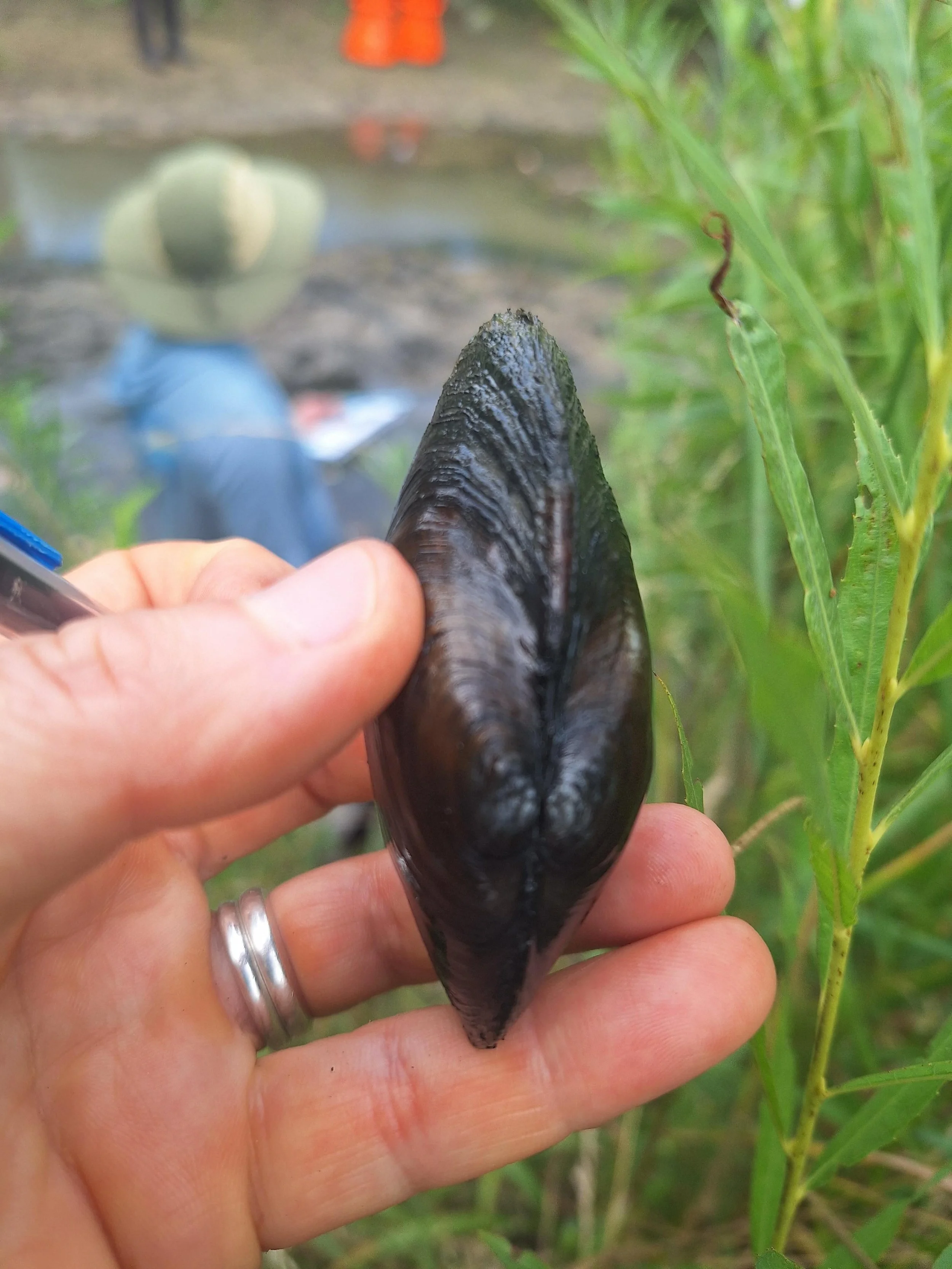Rare mussels discovered in Kentwood park
Photo credit: Grayson Kosak
In the winding waters of Plaster Creek, just upstream from the Grand River, a surprising discovery is reshaping local restoration plans: freshwater mussels—nature’s unsung water purifiers—have been found thriving in an area once used as a golf course.
The finding, made by Plaster Creek Stewards with leadership from local mussel experts during a recent survey, reveals seven different species —a surprising number for an urban waterway. Species like Giant Floater, Spike, and White Heel splitter were common finds along with occasional piles of shells on the stream banks, indicating their role in the ecosystems as providing food for larger animals. Other mussel species found are listed as state threatened and endangered sparking both hope and extra responsibility moving forward.
“This is the kind of ecological surprise that reinforces everything we’re doing to restore this space,” said Andrea Lubberts, program manager for Plaster Creek Stewards, an initiative housed at Calvin University. “Mussels are like the ‘livers of the river’—filtering water, stabilizing stream beds, and signaling overall stream health. The fact that they’re here in these numbers tells us we have something to preserve as well as restore for the future of Plaster Creek.”
The mussel survey took place as part of a larger planning process for a floodplain restoration and streambank stabilization project at Kentwood’s Covenant Park—109 acres of city-owned land transitioning from a retired golf course to public parkland. Located on Plaster Creek, which is a tributary of the Grand River, the site plays a critical role in protecting downstream ecosystems all the way to Lake Michigan.
Supported by funds from the Great Lakes Restoration Initiative via NOAA’s Office for Coastal Management, the planning project is being carried out in partnership with the City of Kentwood, Plaster Creek Stewards, and engineering firms Dewberry and LimnoTech. The initiative’s current phase includes 60% design plans, cost estimates, and proposed future construction and maintenance strategies focused on nature-based solutions to stabilize banks, improve water quality, and build climate resilience.
“These design plans will guide future grant applications and help us restore not just the creek’s eroding edges but increase safe access to this park for the Kentwood community,” said Lubberts. “Finding rare species like these mussels challenges us to be even more thoughtful about plans that take mussel habitat into consideration.”
Beyond ecological value, Plaster Creek Stewards hopes the project will expand community engagement with efforts to restore Plaster Creek in Kentwood. After a dip during the COVID-19 pandemic, participation has surged, with more than 4,000 volunteer hours and 3,200 individuals engaged in 2024. If eventually funded, the implementation of this project will offer more opportunities for Kentwood residents to explore the restored floodplain, learn about the creek, and take action in their community to care for it.
West Michigan Newspop Digital Partners
Community
- Ada
- Algoma
- Allegan
- Allegan County
- Allendale
- Alto
- Baldwin
- Baltimore Township
- Barry County
- Belding
- Belmont
- Benton Harbor
- Bryon Center
- Byron Center
- Caledonia
- Cannonsburg
- Carlton Township
- Carson City
- Cascade
- Cedar Springs
- Cloversville
- Comstock Park
- Coopersville
- Douglas
- East Grand Rapids
- Eastmanville
- Eastown
- Eaton Rapids
- Fennville
- Ferrysburg
- Forest Hills
- Fruitport
- Georgetown Township
- Grand Haven
- Grand Rapids
- Grandville
- Greenville
- Hamilton
- Hart
- Hastings
- Hastings Township
- Holland
- Hope Township
- Hopkins
- Hudsonville
- Ionia
- Ionia County
- Jenison
- Kalamazoo
- Kenowa Hills








